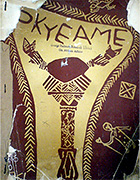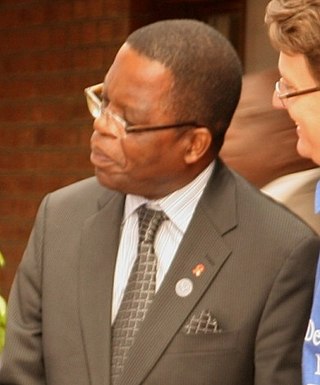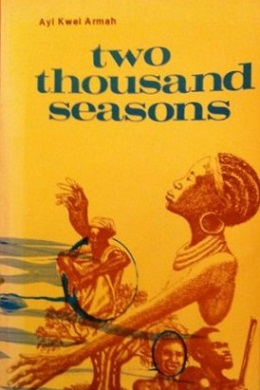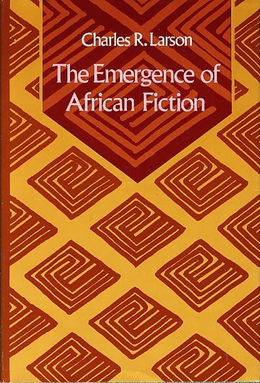Related Research Articles

Kwame Kwei-Armah is a British actor, playwright, director and broadcaster. In 2005, Kwei-Armah became the second black Briton to have a play staged in the West End of London when his award-winning piece Elmina's Kitchen transferred to the Garrick Theatre. He was the first black Briton to head a major British national theater, when he took the directorship of the Young Vic in 2018. Kwei-Armah was appointed Officer of the Order of the British Empire (OBE) in the 2012 Birthday Honours for services to drama.

Ayi Kwei Armah is a Ghanaian writer best known for his novels including The Beautyful Ones Are Not Yet Born (1968), Two Thousand Seasons (1973) and The Healers (1978). He is also an essayist, as well as having written poetry, short stories, and books for children.
Healer may refer to:

The Beautyful Ones Are Not Yet Born is the debut novel by Ghanaian writer Ayi Kwei Armah. It was published in 1968 by Houghton Mifflin, and then republished in the influential Heinemann African Writers Series in 1969. The novel tells the story of an unnamed man who struggles to reconcile himself with the reality of post-independence Ghana.
Ato Sekyi-Otu is a Ghanaian political philosopher. He was born at Saltpond, Ghana in 1941 and until 1971 was known as Daniel Sackey Walker. He was educated at Mfantsipim School, Cape Coast, where he was Head Prefect in 1960-61 and completed his Cambridge Higher School Certificate in 1961 with distinctions in Greek and Latin. He went to Harvard and received an A.B. in Government in 1966. He pursued graduate studies at the University of Toronto where he worked with the renowned Canadian political theorist C.B. Macpherson and received his PhD in 1971.

Okyeame was a literary magazine founded by the Ghana Society of Writers in the post-Independence era, which saw the rapid rise of a new generation of thinkers, writers and poets in the country. The first issue of Okyeame appeared in 1960, and issues were published, at irregular intervals, up until 1972. Inspired by Kwame Nkrumah, the first Prime Minister of Ghana, the publication sought to explore the experiences of Africa from a new intellectual framework. Writers published in the magazine include its first editor Kofi Awoonor, Efua Sutherland, Ayi Kwei Armah and Ama Ata Aidoo.

Osiris Rising: A Novel of Africa Past, Present and Future is a novel written by Ayi Kwei Armah and published in 1995. The story revolves around an African-American woman, Ast, who goes to Africa looking for heritage after she gets her PhD. The text addresses a number of contemporary African issues, including the residual colonial institutions that limit African culture, the hypocritical nature of African Americans and expatriates who try to help Africa and the contemplation of "What is African history and culture?" The book is published by Per Ankh, a Senegalese publishing company.

Ken Diston Lipenga is a Malawian politician, journalist, and writer. He was the Member of Parliament for Phalombe East from 1997 to 2014. He has served in various ministerial positions.
Ayi is a unisex given name. Notable people with the name include:
Ode Ogede is a Nigerian-born American academic who is professor of African literature and was a lecturer at Ahmadu Bello University.

The Beautyful Ones Are Not Yet Born is a jazz album by Branford Marsalis, leading a trio with Jeff "Tain" Watts and Robert Hurst and with guest appearances from Wynton Marsalis and Courtney Pine. It was recorded May 16–18, 1991, at CTS Studio A, Wembley, England, and June 24, 1991, at RCA Studio B in New York City. It peaked at number 3 on the Top Jazz Albums chart.

Two Thousand Seasons is a novel by Ghanaian novelist Ayi Kwei Armah. The novel was first published in 1973 and subsequently published a number of times, including in the influential Heinemann African Writers Series. It is an epic historical novel, attempting to depict the last "two thousand seasons" of African history in one narrative arc following a Pan-African approach.
Kwei-Armah is a Ga surname, which means "to find the way". Notable people with the surname include:
This Earth, My Brother is a 1971 novel by Ghanaian novelist Kofi Awoonor published. It was later republished by Heinemann as part of the influential African Writers Series.

One Love: The Bob Marley Musical previously titled Marley is a musical based on the life and music of Bob Marley, written by Kwame Kwei-Armah.
Ruby Yayra Goka is a Ghanaian dentist and author. She is best known for being a multiple Burt Award for African Literature winner in Ghana.

The Emergence of African Fiction is a 1972 academic monograph by American scholar Charles R. Larson. It was published initially by Indiana University Press, and again, in a slightly revised edition, in 1978 by Macmillan. Larson's study has elicited very different responses: it was praised as an early and important book in the study and appreciation of African literature in the West, but for others it remained stuck in a Eurocentric, even colonizing mode in which Western aesthetics were still the unspoken standard for artistic assessment.
The Collaboration is a dramatic stage play written by New Zealand playwright Anthony McCarten. The play originated in the West End at The Young Vic in London. The original production starred Paul Bettany as Andy Warhol and Jeremy Pope as Jean-Michel Basquiat. The story, set in New York in 1984, centers around the collaboration between Andy Warhol and Jean-Michel Basquiat and their new exhibition. The production transferred on Broadway at the Samuel J. Friedman Theatre in a co-production with the Manhattan Theatre Club and the Young Vic Theatre, starting on November 29, 2022, and ending in February 2023.
Ghanaian literature is literature produced by authors from Ghana or in the Ghanaian diaspora. It starts with a long oral tradition, was influenced heavily by western literature during colonial rule, and became prominent with a post-colonial nationalist tradition in the mid-20th century. The current literary community continues with a diverse network of voices both within and outside the country, including in film, theatre, and modern digital formats such as blogging.
References
- ↑ "'The Healers' by Ayi Kwei Armah". Complete Review . Retrieved 29 March 2022.
- ↑ "'The Healers': novel by Armah". Encyclopedia Britannica . Retrieved 29 March 2022.
- ↑ Lazarus, Neil (1982). "Implications of Technique in Ayi kwei Armah's 'The Healers'". Research in African Literatures . 13 (4). Indiana University Press: 488–498. JSTOR 3818494 . Retrieved 29 March 2022.